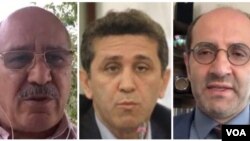Some of Iran’s most prominent lawyers have accused their government of acting unfairly by blocking the vast majority of their profession from handling national security cases.
In a Monday report, Iran’s state-run Tasnim news agency published a list of 20 lawyers authorized to represent clients accused of national security offenses. It said judiciary chief Sadeq Amoli-Larijani approved the list in the last few days, based on Article 48 of Iran’s penal code.
The report by Tasnim, affiliated to Iran’s Islamic Revolutionary Guard Corps, also quoted Iran Bar Association head Isa Amini as criticizing the way the list was drawn up. The Bar Association, founded before Iran’s 1979 Islamic Revolution, is the main Iranian organization for lawyers with more than 20,000 members. Its board elected Amini to head the association in April.
In an interview with Tasnim, Amini criticized the Iranian judiciary’s decision to limit national security cases to 20 vetted lawyers as discriminatory. Amini said the judiciary did not consult his association in drafting the list and did not obtain the consent of some of the 20 lawyers before naming them.
The ability of Iranians to choose their own lawyer is a fundamental right and upholding it enhances the credibility of the judicial system, Tasnim quoted Amini as saying.
Two other independent Tehran-based lawyers interviewed by VOA Persian for Monday’s NewsHour program criticized the government’s decision in stronger terms.
“Article 48 of the penal code violates the Iranian constitution, which gives people the right to access the lawyer of their choice,” said Hossein Ahmadiniaz. The attorney represents an Iranian Kurdish dissident, Ramin Hossein Panahi, facing execution for alleged militant activity, and other clients charged with security offenses. Ahmadiniaz is not among the 20 lawyers included in the government list.
Iranian lawyer Mohammad Hossein Aghasi, also not on the government list, said the Article 48 used to create the list was introduced to the penal code “illegally” in 2013. He also said the clause only enables the vetting of lawyers for national security cases in the preliminary investigation phase of such cases.
But, Aghasi said two of the three Iranian courts dealing with national security issues have unilaterally expanded that vetting to later phases of judicial proceedings, such as court appearances and appeals.
As an example, Aghasi told VOA Persian that he is representing a client charged with security offenses in the appeal phase of a trial. He said he went to an appellate court on Monday as part of the process but was told he could not continue representing the client.
Aghasi said judicial authorities also told him that he could be added to the list of 20 vetted lawyers, provided he returned to the court in the coming days for an interview to determine his qualifications. He expressed annoyance at the need for an interview based on his years of experience.
“The judiciary has done this because they want to limit people’s choices of lawyers, and we as lawyers are opposed to this,” Aghasi said.
Last month, Iranian state media quoted Tehran provincial court chief Gholam Hossein Ismaili as saying the yet-to-be-published list of vetted lawyers for national security cases would not remain closed. But, there has been no official word on when or how many names will be added to it.
This report was produced in collaboration with VOA’s Persian service.




